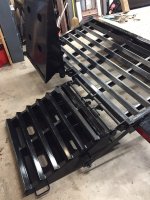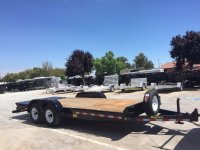I've thought about adding a second trailer - this one for hauling my scut as needed. And like most guys - "thinking about something" of "just looking" is casual - and then there is the actual "looking looking".
I'm amazed at some of the things I've discovered in the last 3 or 4 weeks looking at open trailers (utility and car hauler):
1. I've found new trailers that come in 13 and 16 foot lengths that are single axle - available with a 5200# axle or a 7000# axle and they tilt - which is an attractive choice for hauling a tractor or mower. Configuration is that of a car hauler appearance. PJ Trailer is one brand but I found two other brands in 16 foot that are quite similar concept too.
2. I've always been impressed with Sure Trac's galvanized trailers - a format like a utility in single and tandem axle.
3. Too often - I've now seen steel untility type trailers that are built "too heavy". I don't mean "strong" I mean "heavy". In other words - many trailers look the same - but the quality of their steel or their design of construction vary greatly.
4. But far and away - the biggest thing I've learned is what you often don't see - not the welds, not the design, not the gates or axles or tongues or flooring; its the paint preparation process and choices.
a. some trailer makers give you a huge quantity of purchase choices including - bare metal, unprimed, sandblasted, acid etched, primed, epoxy primed, powder coated, car/tractor paint coated or epoxy painted - or several of these combined. And then there are colors too (I counted as many as 6 color choices without getting custom.
b. I wondered why a friend bought a name brand dump trailer and it started rusting and paint peeling within a year. Guess why? Apparently the dealer was working on getting inventory that was cheaper to buy - so they ordered products without primer or etching.
c. Some brands (small brands) are built with a set standard of acid etched, epoxy primer, and either powder coated or painted. Nice thing about those brands is you aren't "guessing" at the dealer's location what you are getting.
5. My point is - buying trailers used to be "what you could see" like welds and pockets and metal thickness, pipe or angle, etc. - and everyone primed their trailers - so a dealer's situation was inventorying and selling. Now its not so simple - and researching model numbers and "options" has become much more important because the exact same manufacturer and trailer model number - can have many different option choices which changes the longevity and future appearance of that trailer.




